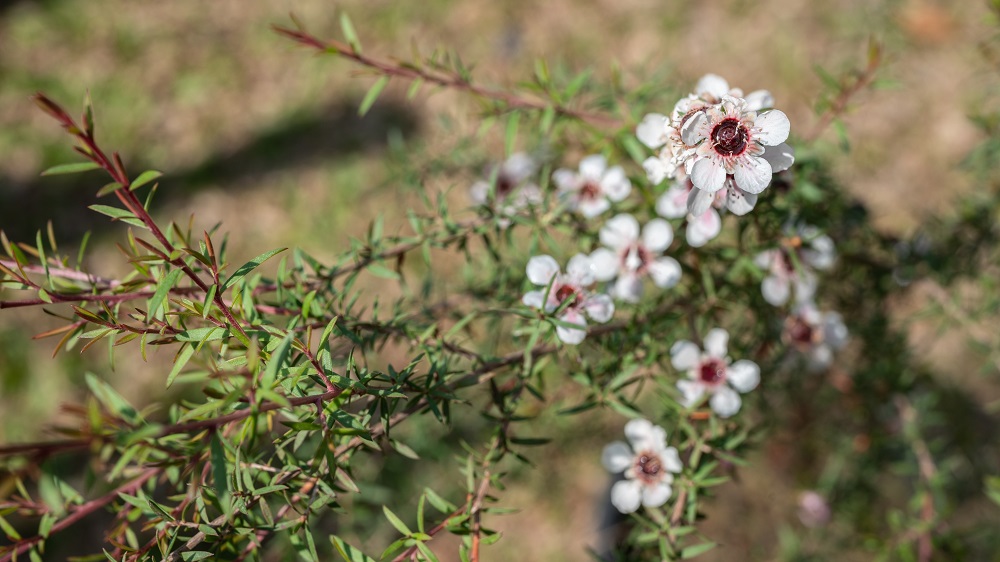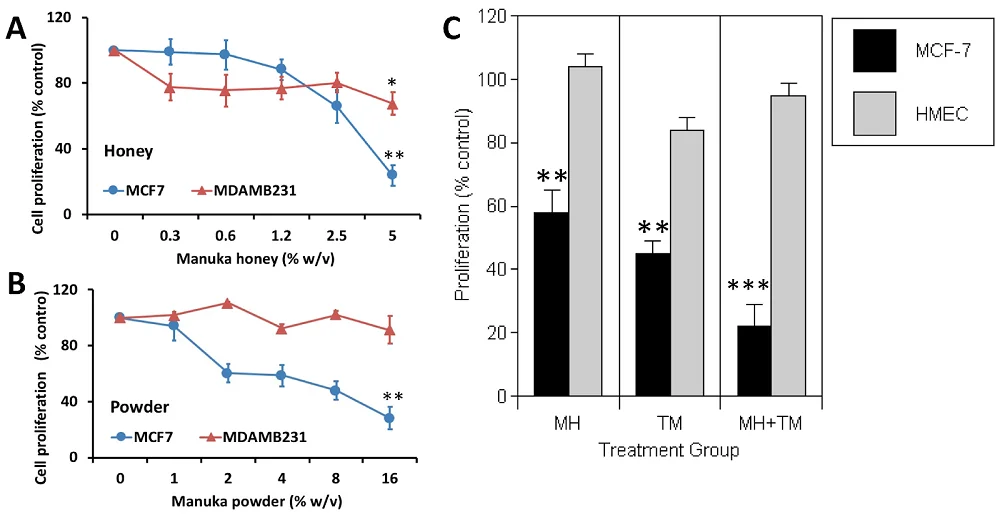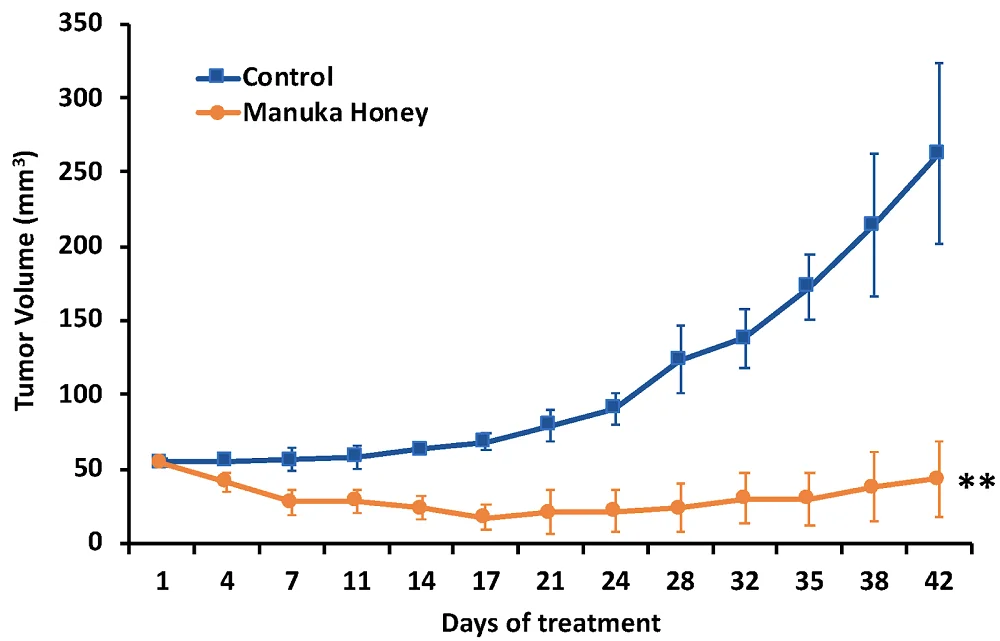Manuka Honey Effective Against Breast Cancer in Mice
- This approach is most effective as part of a combination.

UCLA scientists have shown that Manuka, an exclusive honey variety, can quench estrogen receptor-positive breast cancer in vitro and in vivo [1].
Honey, kill that cancer
Breast cancer remains the deadliest type of cancer in women, claiming more than 40 thousand victims a year in the US alone. Of its subtypes, estrogen receptor (ER)-positive is the most common, constituting 70-80% of all cases. Generally, ER-positive breast cancers have a better prognosis because they are often slower-growing and respond well to hormone therapy. That said, it depends on how early the cancer was detected, and the recurrence rates over several years are high.
Although modern oncology has made great strides, most anti-cancer therapies are still blunt tools that cause massive side effects and even accelerate aging [2]. The search for safer therapeutic options continues, including in the realm of natural products. Several of them, including curcumin, resveratrol, and quercetin, have shown promise against cancer, mostly in tandem with established anti-cancer therapies [3]. Honey, however, has seldom been seriously investigated.
Honey has a bad rap as “just sugar.” However, some of its varieties have been linked to a number of health benefits. Manuka honey is one of the most exclusive and expensive ones, hailing from New Zealand and some parts of Australia. It is produced by bees that pollinate the flowers of the Manuka tree (Leptospermum scoparium).
Manuka honey is known for its distinctive antibacterial properties. These are attributed mainly to the compound methylglyoxal (MGO), which is also a potent antioxidant. Other compounds abundant in Manuka honey include polyphenols and amino acids.
Recent research indicates that manuka honey can induce death by apoptosis in several cancer cell lines and helps prolong survival in some murine models of cancer [4]. Possible mechanisms of action include selective estrogen receptor modulation and inhibition of growth factor signaling pathways.
Bad for bad cells
In this new study conducted by UCLA scientists, Manuka honey and Manuka powder were first applied to cell lines of ER-positive breast cancer, triple-negative breast cancer (TNBC, a rarer but deadlier variant that lacks all three receptors common in breast cancer), and healthy mammary tissue cells.
Both honey and powder drastically decreased cellular proliferation in the ER-positive cells at high concentrations, but honey was also mildly effective in TNBC cells. In another experiment, Manuka honey was almost as effective in blocking proliferation as tamoxifen, the estrogen blocker widely used against ER-positive breast cancer. However, Manuka honey was safer for non-malignant human mammary epithelial cells (HMECs). Importantly, the two treatments showed powerful synergistic effects. Cancer cells develop resistance to tamoxifen rather quickly, making Manuka honey’s independent effectiveness important.

24 hours after treating ER-positive cancer cells with Manuka honey, more than 80% of them died by apoptosis. Here too, the effect was dose-dependent. TNBC cells also experienced apoptosis, but to a lesser degree. The researchers used a different type of honey as a control, and it did not produce any of Manuka honey’s effects.
In addition to inducing apoptosis, Manuka honey might counter the growth of cancer cells by inhibiting the growth-promoting protein mTOR. In high concentrations, Manuka honey effectively increased the levels of AMPK, a protein that negatively modulates the mTOR pathway.
Tumor growth blocked
The researchers then tested Manuka honey in a mouse model of ER-positive breast cancer. After the tumors grew to a size of 50-75 cm3, the mice started receiving orally either Manuka honey or dextrose as control, and the former blocked tumor growth almost completely.

“The findings provide hope for development of a natural, less toxic alternative to traditional chemotherapy,” said Dr. Diana Marquez-Garban, associate professor of medicine at the David Geffen School of Medicine at UCLA, and the study’s first author. “Although more research is necessary to fully understand the benefits of natural compounds in cancer therapy, this study establishes a strong foundation for further exploration in this area.”
Our findings confirm that MH has potent anticancer properties through different mechanisms. MH’s unique composition, including phenolic compounds and methylglyoxal, has been reported to have antioxidant, antiseptic, and anticancer properties. MH inhibited in vitro cell proliferation of MCF7 cells in a dose-dependent manner and induced apoptosis through PARP activation. Further, MH activated AMPK and inhibited mTOR downstream signaling as well as STAT3. Notably, orally administered MH inhibited the growth of MCF7 tumor xenografts in vivo without major side effects. These findings indicate that natural compounds such as Manuka honey, with significant antitumor activity and selectivity towards hormone receptor-positive breast cancers, may be further developed as a supplement or potential alternative to cytotoxic anticancer drugs that have more non-selective adverse effects.
Literature
[1] Márquez-Garbán, D. C., Yanes, C. D., Llarena, G., Elashoff, D., Hamilton, N., Hardy, M., … & Pietras, R. J. (2024). Manuka Honey Inhibits Human Breast Cancer Progression in Preclinical Models. Nutrients, 16(14), 2369.
[2] Bhatia, R., Holtan, S., Jurdi, N. E., Prizment, A., & Blaes, A. (2022). Do cancer and cancer treatments accelerate aging?. Current oncology reports, 24(11), 1401-1412.
[3] Lotfi, N., Yousefi, Z., Golabi, M., Khalilian, P., Ghezelbash, B., Montazeri, M., … & Eskandari, N. (2023). The potential anti-cancer effects of quercetin on blood, prostate and lung cancers: An update. Frontiers in immunology, 14, 1077531.
[4] Ahmed, S., Sulaiman, S. A., & Othman, N. H. (2017). Oral Administration of Tualang and Manuka honeys modulates breast cancer progression in Sprague‐Dawley rats model. Evidence‐Based Complementary and Alternative Medicine, 2017(1), 5904361.








